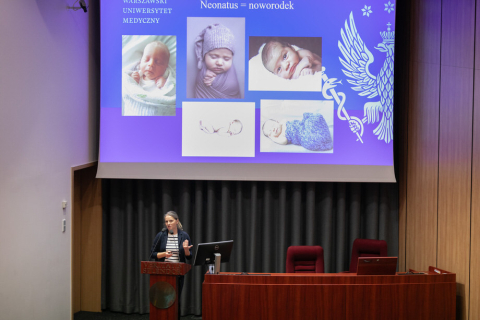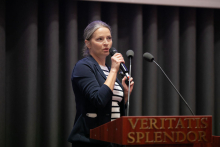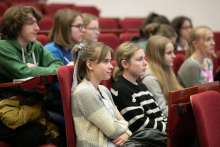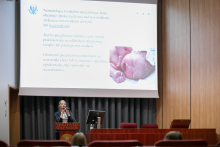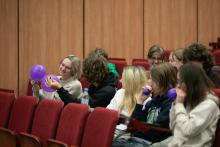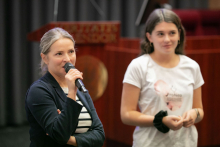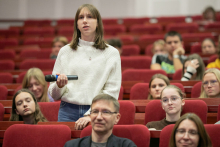What is neonatology
This is a separate specialty of medicine that involves the medical care of newborns. It is usually practiced in intensive care or neonatal pathology units. If the baby is born healthy, the neonatologist's care is minimal. The main patients are those newborns who are born sick or require special medical care, for example, due to prematurity.
The speaker talked about her work with neonates with very strong emotions. - I have been working in the neonatology department for more than 30 years, it was my first place right after my internship. Admittedly, at first I wanted to be a gynecologist, but later, working on neonates, each subsequent year brought me confidence that I had chosen well - said Dr. Beata Borek-Dzięcioł.
Why neonatology is such an important specialty
- A newborn is a very complicated patient, because in the first minutes after birth all his organs have to adapt to ectopic life - Dr. Beata Borek-Dzięcioł stressed. If he is then not given proper care, especially if he was born sick or premature, this will have a huge impact on his further development. That is why the neonatal period, covering the first 28 days of life, has been bestowed with the highest caution and a specialty such as neonatology has been singled out.
The neonatologist must assess whether what is happening to the newborn is still an adaptation to new conditions or already a pathology and requires immediate help, such as resuscitation or reanimation. It is this specialist who decides which baby can stay with its mother immediately after birth, and which needs to be taken to the neonatal unit for further observation.
Fight for the first breath - experience with balloons
The lungs are the only organ that does not perform its primary function during the prenatal period, which is gas exchange. Why is it that breathing is considered the most difficult activity for a newborn. To understand this, lecture participants were given balloons to inflate. Not everyone managed to inflate them, and some got very tired as the balloons stuck together. Dr. Borek-Dzięcioł explained: - The balloons are a reflection of a newborn's pulmonary alveoli. With the first breaths, the baby has to expand the alveoli, has to empty them of lung fluid, and has to do it fairly quickly. And each breath is filling more and more alveoli, which can stick together, just like your balloons. That's why the first breath is very difficult. And if the newborn can't get it, we have to help him with it and decompress his lungs, sometimes even breathe for him. That's what a neonatologist is for - the speaker added.
Opportunity for babies born prematurely
A premature baby is any baby who is born before the 37th week of pregnancy. This is a very heterogeneous group of children, not only in terms of time of birth, but also in terms of weight - there are children who weigh less than 1,500 grams, but also those who weigh sometimes even less than half a pound of sugar. Such children are dealt with by a neonatologist. And thanks to advances in medicine, neonatologist can help them with very good results. - There is a girl with us, born at 23 weeks with a weight of 440 grams - said Dr. Borek-Dzięcioł. - She is developing completely well. Of course, 17 weeks later compared to her peers born on time, but harmoniously.
Dr. Borek-Dzięcioł told high school students about the milestones of modern neonatology. The breakthrough moment was undoubtedly the invention and later - the introduction into widespread use - of surfactant, a preparation administered directly into the lungs that promotes their decompression and easier breathing. Other milestones include the invention of the incubator, ventilator and other methods of respiratory support, as well as prenatal administration of steroids and the possibility of parenteral nutrition. The future of modern neonatology is prenatal surgery and gene therapy.
- Looking at the baby and noticing discrete changes is very important - the speaker stressed - that is why neonatology teams are multi-generational and include older people with vast experience and young people with vast knowledge and fresh minds, after specialization and courses.
Voice of female students from the neonatology scientific circle
The lecture was also attended by students from the ProNeo Student Scientific Circle operating at the Department of Neonatology and Rare Diseases UCC MUW: Julia Śladowska and Malgorzata Kamińska. The girls emphasized how interesting and important neonatology is. Julia said: - The first hour, the first month, the first year are important in terms of the child's future development. Everything matters and has a real impact on its functioning. The impact on a person's future. And this is what I would like to interest you in.
After the lecture, students had the opportunity to ask the speaker their questions. The meeting was attended by: Klementyna Hoffmanowa High School No. IX, Władysław IV High School No. VIII, Stefan Batory High School No. II with Bilingual Branches, Tadeusz Czacki High School No. XXVII, Stefan Żeromski High School No. XL with Bilingual Branches.
